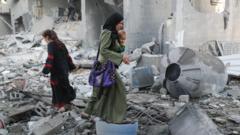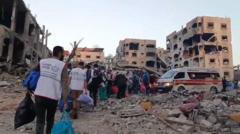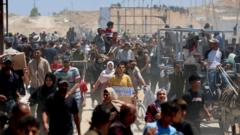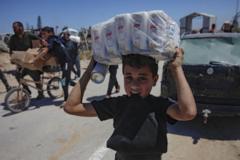The conversation raises issues of humanitarian aid access and the international community's response to the ongoing crisis in Gaza.
**UN Representative Accuses Israel of Forcing Starvation in Gaza During BBC Interview**

**UN Representative Accuses Israel of Forcing Starvation in Gaza During BBC Interview**
In a startling interview, the UN's humanitarian chief alleges that Israeli actions in Gaza amount to forced starvation, potentially a war crime.
In a recent interview with the BBC, Tom Fletcher, the UN's humanitarian chief, claimed that people in Gaza are being subjected to what he described as forced starvation due to Israeli actions. He stated that this situation represents a change in global perceptions regarding the humanitarian crisis unfolding in the region. When questioned whether this could be classified as a war crime, Fletcher affirmed, "Yeah, it is," emphasizing that such matters were ultimately for courts and history to judge.
Fletcher expressed remorse for his previous comment about the imminent death of 14,000 babies in Gaza if aid was not allowed in, a statement the UN later contradicted. He acknowledged the necessity for precision in language amid the dire situation. Following nearly three months of blockade, Israel began allowing limited aid into Gaza last week, but their military campaign against Hamas resumed shortly after, which resulted in rising tensions.
Scenes of chaos erupted at aid distribution centers, notably those operated by the Gaza Humanitarian Foundation (GHF), as desperate citizens sought food and essentials. The UN has refrained from collaborating with GHF, criticizing their operations, while clashes and injuries have marred the aid distribution process. Fletcher pointed out that food remains at the border while people in Gaza are starving, asserting that Israeli officials openly cited these measures as a means of pressure against the population.
In light of statements made by Israeli officials regarding the state of despair among Gazans, Fletcher insisted that such rhetoric should be denounced, urging Prime Minister Benjamin Netanyahu to reject the idea of forced displacement as a potential policy. International criticism toward Israel's military actions has increased, with European leaders openly condemning the excesses of the current offensive.
Earlier this month, Fletcher called upon the UN Security Council to take action to prevent what he termed genocide in Gaza, reflecting on past global failures to intervene adequately during crises like those in Rwanda and Sri Lanka. He faced backlash from Israeli authorities after suggesting a humanitarian disaster in Gaza. However, Fletcher contended that his statements were a desperate attempt to highlight the urgent need for aid and save lives.
He reaffirmed his commitment to humanitarian principles, seeking to ensure that aid reaches civilians rather than being diverted to Hamas, and stressed the importance of dialogue over military solutions. As he managed humanitarian crises across the globe, Fletcher underscored that the international community is at a critical juncture, with prolonged conflicts and increasingly polarized responses complicating the resolution of humanitarian needs.





















